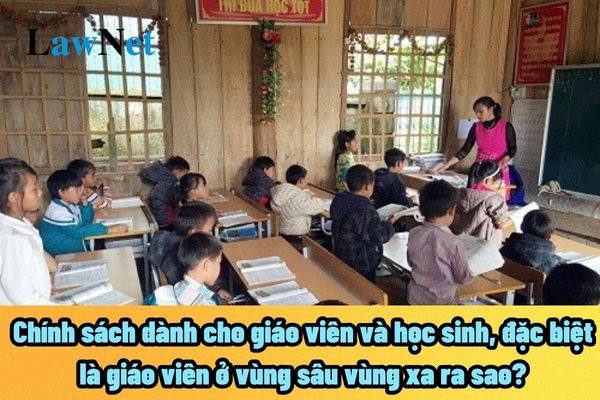What are policies for teachers, students, and teachers in remote areas in Vietnam?
What are policies for teachers, students, and teachers in remote areas in Vietnam?
The shortage of teachers, particularly those in remote areas leads to following consequences:
The quality of teachers is not uniform; some teachers still lack professional and pedagogical skills.
Teachers in remote areas often face many difficulties regarding their living conditions and working conditions, leading to a serious shortage of teachers.
Based on Subsection 1, Section 2 of Joint Circular 01/2006/TTLT-BGD&DT-BNV-BTC, the regulation on allowance levels for teachers directly teaching in schools in remote and isolated areas is specified as follows:
Allowance Levels
...
c) The allowance rate of 35% is applied to educators who are directly teaching in preschools, primary schools in delta regions, cities, district-level towns; lower secondary schools, upper secondary schools, general technical - vocational orientation centers, continuous educational centers, vocational training centers in mountainous areas, islands, remote, and particularly hard-to-reach areas;
...
e) The allowance rate of 50% is applied to educators who are directly teaching in preschools, primary schools in mountainous areas, islands, remote, and particularly hard-to-reach areas.
The determination of mountainous areas is implemented according to the regulations of the Ethnic Committee; islands according to geographic reality; remote and particularly hard-to-reach areas depending on the characteristics of each locality as guided by the provincial People's Committee after obtaining unified opinions from the Joint Ministries.
Thus, the support policies for teachers, especially those in remote areas, specify the allowance levels for teachers directly teaching in schools in remote areas as follows:
- An allowance of 35% for teachers directly teaching in:
+ Lower secondary schools;
+ Upper secondary schools;
+ General technical - vocational orientation centers;
+ Continuous educational centers;
+ Vocational training centers.
- An allowance of 50% for teachers directly teaching in:
+ Preschools;
+ Primary schools.

What are policies for teachers, students, and teachers in remote areas in Vietnam? (Image from the Internet)
What are the support policies for students in remote areas in Vietnam?
The Government of Vietnam always pays attention to education for students in remote areas (particularly difficult areas) and has various support policies to ensure they have the best learning opportunities.
These policies include:
1. Infrastructure support:
- The State invests in building and repairing schools, housing for teachers, and boarding students.
- Provides teaching and learning equipment for schools.
- Ensures school infrastructure meets the minimum learning needs of students.
2. Financial support:
- Grants scholarships and allowances for poor students and those in difficult circumstances.
- Supports meals, and accommodation for boarding students.
- Exempts or reduces tuition fees for students from poor and near-poor households.
- Provides funding for extracurricular educational activities.
3. Teacher support:
- Prioritizes the appointment of teachers with high professional and pedagogical skills to teach in remote areas.
- Supports teachers with their living conditions and working conditions.
- Organizes training and professional development programs for teachers.
4. Educational program support:
- Applies an education program suitable to the actual conditions of students in remote areas.
- Supplements educational content on life skills and escape skills for students.
- Uses effective and interactive teaching methods.
5. Social support policies:
- Provides healthcare support and health protection for students.
- Supports students in cultural and sports activities.
- Facilitates students' participation in social activities.
The support policies for students in remote areas have significantly contributed to improving the quality of education, the rate of student enrollment, especially among poor and near-poor households. However, some difficulties and challenges still need to be addressed to ensure that students have the best learning opportunities.
Some solutions to enhance the effectiveness of the support policies for students in remote areas:
- Increase investment in education in remote areas.
- Perfect the legal system regarding education in remote areas.
- Improve the quality of the teaching staff.
- Strengthen propaganda and mobilize students to attend school.
- Coordinate closely between schools, families, and society in educating students.
Which teachers will receive regular training policies in Vietnam?
The new policy for teachers includes the addition of teachers receiving regular training. To be specific:
Based on Clauses 1 and 2 of Article 2 Circular 19/2019/TT-BGD-DT (amended by Clause 1, Article 1 Circular 17/2022/TT-BGDDT), teachers receiving regular training include:
- Teachers nurturing, caring for, and educating at kindergartens, preschools, independent nurseries, independent kindergarten classes, and independent nursery classes;
- Teachers teaching at primary schools, lower secondary schools, upper secondary schools, comprehensive schools, gifted schools, boarding ethnic schools, semi-boarding ethnic schools, schools for disabled students;
- Teachers teaching at continuous education centers, teachers of educational programs under the national education system in vocational - training and continuous education centers.

